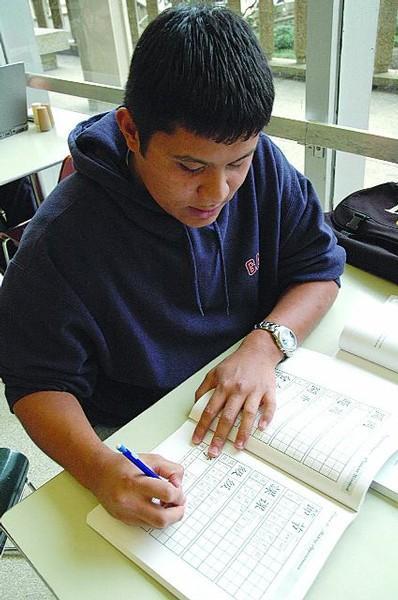Though Carlo Malacon never learned to speak Spanish and Filipino – his parents’ native tongues —— Chinese has become his second language.
Malacon is studying the language to gain a competitive edge in the job market when he graduates.
The finance sophomore minoring in Chinese is part of a growing trend among college students studying languages other than English to get ahead in the business world.
According to a 2002 report by the Modern Language Association, about 1.4 million college students were studying languages other than English. About 750,000 students enrolled in Spanish, 200,000 in French and 100,000 enrolled in German language courses.
Malacon said he hopes to use his Chinese language skills in business – either in selling and developing real estate or working with investors in China.
Malacon said he may sell real estate in Houston, which has the largest Asian population in Texas and ranks 12th in the nation, according to a demographic profile from the Houston Chronicle.
Malacon said he also hopes to eventually learn Taglog, a combination of Spanish and English written in English characters, which is his mother’s native language.
“I think, among a pool of speakers of Spanish and French, a person who speaks a less common language will have an advantage,” Malacon said. “I like to be different. I’d be like a needle in a haystack.”
Emily Batinski, chair of the Department of Foreign Languages and Literatures, said the University will be hiring eight Chinese professors to teach the language and culture – four in the College of Arts and Sciences and four in the E.J. Ourso College of Business.
The E.J. Ourso College of Business will also be adding a focus on Chinese study into its curriculum by offering a minor in Chinese culture and commerce beginning summer 2006.
“We need people who are fluent in those languages,” Batinski said of students
learning widely used languages they can use in international business relations. “We don’t have many [students] trained in those skills.”
Batinski said students in international studies can take a diverse course load and concentrate on a specific area, such as Asia or Latin America.
“It’s very important dealing with a foreign country – it’s more than just the language,” Batinski said. “You have to know how to view the world, see the world and social norms.”
Qiancheng Li, Chinese professor, said almost all language classes include cultural lessons.
“It becomes part of yourself,” Li said of learning a foreign language. “Language is not all about communication. It is a personal enrichment. It’s more than business.”
Houston Middleton, international studies and Spanish senior, is focusing his area of study on Latin America.
“I’m going to law school next year, and I’d like to work in international corporations,” Middleton said.
Middleton said taking Spanish classes focused on Latin American politics and culture will be beneficial when he graduates.
“I think it’s a part of the world that is not understood very well,” said Middleton, who hopes to get a job in Central America. “A lot of people focus on Europe and China, but there are a lot of business opportunities in Latin America.”
Spanish is supposed to be the most widely spoken language by 2050, Middleton said.
The U.S. Census Bureau projects the U.S. Hispanic population to reach 100 million in 2050. There are more than 400 million native Spanish speakers internationally and more than 38 million in the United States, according to the Census Bureau.
“That’ll be in [college students’] lifetime – globalization is making things smaller,” Middleton said. “If you can do anything in two languages, it makes you that much more marketable.”
Speaking their language
December 8, 2005

Carlo Malacon, finance sophomore, is in beginning level Chinese and in preparation of pursuing a minor in the language. Once he graduates, he hopes to incorporate the use of the language with work in real estate either in China or in Houston, which has th
Speaking their language



